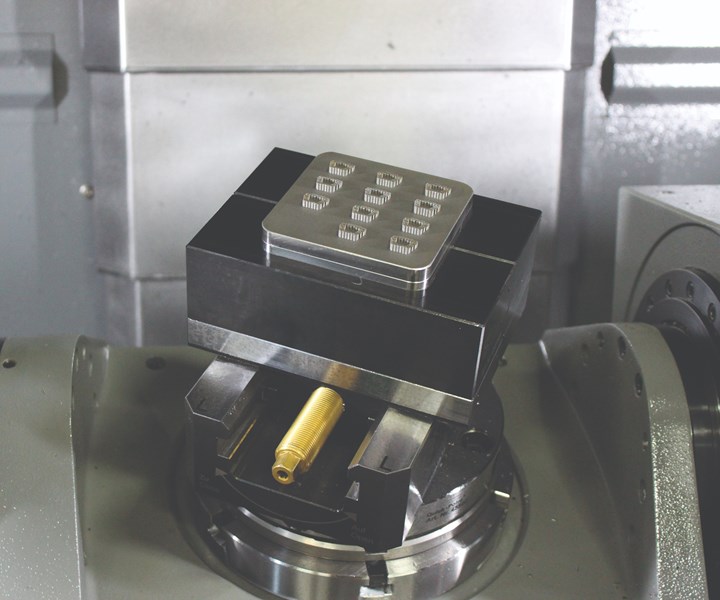For 3D Printed Implant Maker, CNC Machining Is Capacity Constraint
Additive manufacturing is realizing its promise for scale production during the coronavirus period, but machining is an essential downstream capacity need that has to be expanded to keep up.
Share






Here are 3D printed spine implants set up in the five-axis machining center, prior to their being cut off of the additive manufacturing build plate. Machining capacity is needed as additive manufacturing production rates increase, as described in the video below.
During the coronavirus period, , which makes medical implants through additive manufacturing (AM), has not slowed down at all. To the contrary, with elective surgeries being delayed, implant suppliers are ordering more inventory to stock up to get ready for the surge. Tangible is now 3D printing implants at the rate of about 1,000 per week — its highest sustained rate of production yet.
On “The Cool Parts Show,” the , we recently checked in with Tangible Solutions’ co-founder Chris Collins to learn about this production. The challenge he sees in maintaining this rate relates to CNC machining.
In fact, in spite of the difficulties with interviewing given social distancing precautions, the company has been seeking to hire another machinist as part of its response to the business demand.
Metal AM parts typically need precision machining. Operations required for Tangible’s implants start with precisely cutting the parts from the AM build plate, then routinely include drilling or reaming as well as tapping and profile milling. The full productive capacity of Tangible’s metal AM machines (powder-bed fusion machines from Concept Laser, now part of GE Additive) has not been realized yet, but the capacity of its five-axis machining centers from Hurco might be coming close. As a result, Mr. Collins says a new machine tool purchase is liable to come before another 3D printer.
Learn more in this episode of “The Cool Parts Show” below, or read the episode .
Related Content
-
Forkardt Hardinge Swiss Workholding Provides Reliable, Consistent Performance
The company’s Swiss collets are designed to securely hold parts without marring surfaces, minimizing vibration to ensure smoother machining, enhanced accuracy and extended tool life.
-
Supercritical Success for Medical Machining
High-pressure carbon dioxide coolant can dramatically improve the production rate of titanium parts while leaving no residue — an excellent fit for medical machining.
-
Shop Tour Video: From Garage Shop to Leading Aerospace Supplier
From repairing aircraft interiors to manufacturing medical implants, Superior Joining Technologies excels at CNC machining, TIG welding, laser welding, and NADCAP-accredited nondestructive testing. Discover how this Rockford-based company supports the aerospace industry through a combination of advanced technologies.
















